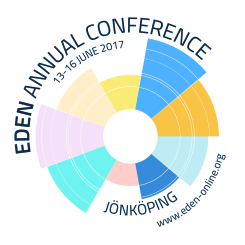I recently attended the EDEN (European Distance learning and E-Learning Network) Conference at Jönköping University in Sweden to present on a collaborative project between the City Law School and the Educational Technology Team in LEaD. This involved creating transmedia resources for the LLB in Legal Practice, a distance learning programme delivered by the City Law School in partnership with CILEx – the Chartered Institute for Legal Executives.
I also attended some excellent sessions. One of the most interesting was by Professor Ignatius Gous from the University of South Africa, who talked about his Propel Learn programme – an evidence based programme engendering self-directed life-long learning habits and strategies for distance education students and staff. The paid-for programme is available here however Professor Gous addressed some general points about the way we learn effectively, as well as addressing some common neuromyths about the mind and how we learn.
- People can be classified as either right-brain or left-brain dominant
- We only use 10% of our mind at any given time, and we can learn to use more
- People have different learning styles, such as visual, auditory or kinaesthetic
All of these, you may be surprised to hear (most of the audience certainly were), are incorrect. The last of these, regarding learning styles, is something I have come across before in this Guardian article which suggests that teaching using a variety of styles is better than matching students to just one specific learning style.
As well as this, Professor Gous talked about the mindset theory, introduced by Carol Dweck, a Psychologist from Stanford University, which suggests that individuals either have a fixed mindset, which puts limitations on their learning and development, or a growth mindset, where the individual believes that they have the potential to improve their qualities and traits through effort and training.
Another excellent session came from Miguel Lancho from The National Distance Education University (UNED) in Spain. He talked about the G-Rubric tool that they have developed and been using with their Economic History students. The aim of the tool is to provide automated iterative feedback for open-ended questions in order to aid performance improvement. The tool was developed to address the issue of providing quality feedback to potentially large student cohorts in a sustainable way. Students attempt a question (such as defining a concept) and are given a score for the content of their question, as well as feedback on their style and grammar. They can then reattempt the question, using the feedback given, and check to see if their answer has improved, as shown in the images below.
You can read more about the Eden conference on their website including the keynote presentations and video interviews with the speakers.






Hi Fariha, Is there a way of viewing the G Rubric page in English?
Thanks
Hi James, if you open the link in Google Chrome, then you should get the option to translate it to English.